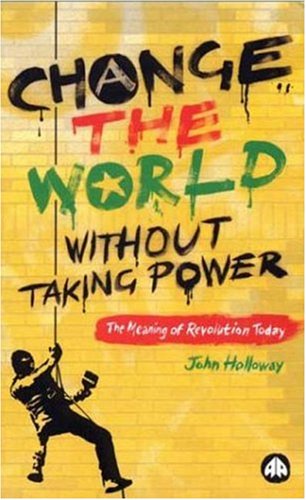John Holloway: Change the World without Taking Power: The Meaning of Revolution Today (2002)
Filed under book | Tags: · activism, anarchism, marxism, revolution, social movements

“The series of demonstrations since Seattle have crystallised a new trend in left-wing politics. Popular support across the world for the Zapatista uprising and the enthusiasm which it has inspired has led to new types of protest movement that ground their actions on both Marxism and Anarchism. These movements are fighting for radical social change in terms that have nothing to do with the taking of state power. This is in clear opposition to the traditional Marxist theory of revolution which centres on taking state power. In this book, John Holloway asks how we can reformulate our understanding of revolution as the struggle against power, not for power.
After a century of failed attempts by revolutionary and reformist movements to bring about radical social change, the concept of revolution itself is in crisis. John Holloway opens up the theoretical debate, reposing some of the basic concepts of Marxism in a critical development of the subversive Marxist tradition represented by Adorno, Bloch and Lukacs, amongst others, and grounded in a rethinking of Marx’s concept of ‘fetishisation’– how doing is transformed into being.
The struggle for radical change, Holloway argues, far from being marginalised, is becoming more and more embedded in our everyday lives. Revolution today must be understood as a question, not as an answer.”
First published 2002
New edition
Publisher Pluto Press, 2005
ISBN 0745324665
237 pages
Change the World without Taking Power (English, 2nd ed., 2002/2005, updated on 2017-1-2)
Cambiar el mundo sin tomar el poder (Spanish, 2005, added on 2017-1-2)
John Roberts: Philosophizing the Everyday: Revolutionary Praxis and the Fate of Cultural Theory (2006)
Filed under book | Tags: · critique, cultural theory, democracy, marxism, political theory, politics

“After modernism and postmodernism, it is argued, the everyday supposedly is where a democracy of taste is brought into being – the place where art goes to recover its customary and collective pleasures, and where the shared pleasures of popular culture are indulged, from celebrity magazines to shopping malls. John Roberts argues that this understanding of the everyday downgrades its revolutionary meaning and philosophical implications. Bringing radical political theory back to the centre of the discussion, he shows how notions of cultural democratization have been oversimplified. Asserting that the everyday should not be narrowly identified with the popular, Roberts critiques the way in which the concept is now overly associated with consumption and ‘ordinariness’. Engaging with the work of key thinkers including, Lukacs, Arvatov, Benjamin, Lefebvre, Gramsci, Barthes, Vaneigem, and de Certeau, Roberts shows how the concept of the everyday continues to be central to debates on ideology, revolution and praxis. He offers a lucid account of different approaches that developed over the course of the twentieth century, making this an ideal book for anyone looking for a politicised approach to cultural theory.”
Publisher Pluto Press, 2006
ISBN 0745324118, 9780745324111
147 pages
PDF (updated on 2014-7-26)
Comments (3)Damian F. White: Bookchin. A Critical Appraisal (2008)
Filed under book | Tags: · anarchism, critical theory, deep ecology, democracy, ecology, environmental ethics, marxism, participation, philosophy, political ecology, social theory, urban planning

This is the first comprehensive overview of the work of Murray Bookchin, the left-libertarian social theorist and political ecologist who is widely regarded as the visionary precursor of anti-corporate politics. Bookchin’s writing spans fifty years and engages with a wide variety of issues: from ecology to urban planning, from environmental ethics to debates about radical democracy. Weaving insights from Hegel and Marx, Kropotkin and Mumford, Bookchin presents a critical theory whose central utopian message is ‘things could be other than they are’. This accessible introduction maps the evolution of Bookchin’s project. It traces his controversial engagements with Marxism, anarchism, critical theory, postmodernism and eco-centric thought. It evaluates his attempt to develop a social ecology. Finally, it considers how his thinking relates to current debates in social theory and environmentalism, critical theory and philosophy, political ecology and urban theory. Offering a clear account of Bookchin’s key themes, this book provides a critical but sympathetic account of the strengths and weaknesses of Bookchin’s writing.
Publisher Pluto Press, 2008
Original from the University of Michigan
Digitized Jul 17, 2009
ISBN 0745319645, 9780745319643
Length 236 pages
More info (publisher)
More info (google books)

